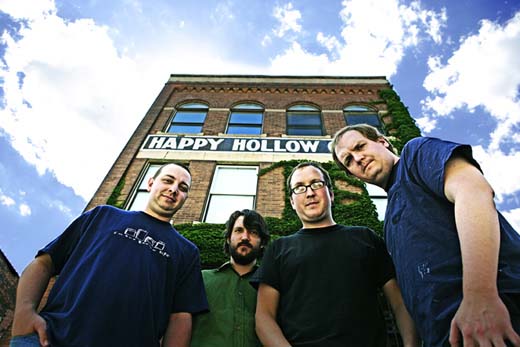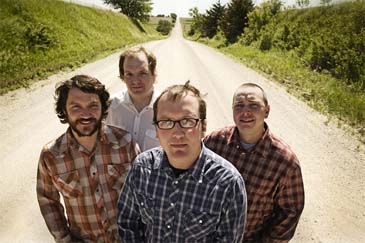|

Cursive:
Seize the Deity
Cursive's Happy Hollow
is Tim Kasher's and Ted Stevens' take on religion, faith and society
at a time in their lives when their god has lost his way.
story by tim
mcmahan
| |
|
Lazy-i: July 12, 2006
|
Cursive
w/ Make Believe, La Salle
Saturday, July 15, 8 p.m.
Sokol Auditorium
13th & Martha
$12
|
|
|
There will
be those who will say Happy Hollow, the new CD by Omaha
rock band Cursive, is an attack on a life of religious faith --
a life that chief songwriter and frontman Tim Kasher at first
accepted… and then rejected.
Considering
some of the songs' themes -- the ties between faith and war, Immaculate
Conception, the Big Bang Theory and the tortured life of a homosexual
priest -- they might have a point. But Kasher and fellow Cursive
songwriter Ted Stevens will likely tell those critics that they're
wrong.
Certainly
both are well-versed on the subject matter. Both attended Creighton
Prep after attending Catholic grade school, and both say religion
played an important role in their young lives.
"I believed
in it fully when I was in Catholic grade school," Kasher
said via cell phone after eating lunch at a Cracker Barrel somewhere
on the way to their gig last Saturday in Pittsburgh. "And
there was a time in my life when I could have gone heavily in
that direction. But when I was a teenager, I met some people that
were atheists who were amazing, generous and kind. They were forward-thinking,
and I became disillusioned and angry. Now I'm only angry about
the marriage of church and state."
"Tim
is definitely more of an atheist, and that's all right,"
Stevens said in a separate phoner moments after Kasher's. "I'm
at a time in my life where I'm less atheistic and more agnostic.
I don't see being an agnostic as a weak argument, but as a Socratic
position, a safety zone of ideology. Everyone in the band has
their own idea of the afterlife or god or the devil. We all share
a loose idea of that. I hope that the record doesn't come across
as a negative attack, but as an argument for humanism."
|
|
|
Heady
stuff from a rock band whose core fans are more apt to worship Steven's
and Kasher's guitar work then ponder their deeply insightful lyrics.
Along with bassist Matt Maginn and drummer Clint Schnase (and a
variety of members who've come and gone over the years) Cursive
has positioned itself as a central part of Saddle Creek Records'
musical triumvirate. Where Bright Eyes is the label's introspective
folky, and The Faint is the electric retro dance party, Cursive
is -- and has always been -- the band that rocks. And rocks hard,
going all the way back to their non-Saddle Creek debut, '97's Such
Blinding Stars for Starving Eyes, through their Creek debut,
'00's Domestica, through their best-selling '03 classic The
Ugly Organ -- the album that pushed them ever closer toward
breaking through indie rock's glass ceiling.
It's a barrier
that could very well fall with Happy Hollow, the band's most
pop-centric, approachable and, well, swinging, attempt at rock.
It's also lyrically their most controversial, a fact that hasn't
been lost on the band.
"We made
a personal decision while we were writing this record that we were
going to avoid a real negative slant, and keep things positive,"
Kasher said. "I want to be responsible about it. It's so typical
in a medium like rock and roll to be another screamer, putting down
the administration and the establishment. We just want to bring
up our suggestions for solutions."
Still, in an
era when a presidential administration freely admits being guided
by faith in all its decisions including going to war, Kasher and
Stevens have a lot on their minds. Happy Hollow is a 14-song
morality play whose characters have either been duped by religion,
trapped by religion, betrayed by religion or coerced by religion,
each looking to faith as a leverage or excuse for the events in
his or her life.
Kasher sums
up his point of view on the anthem "Rise Up! Rise Up!"
where he sings his confession: "I wasted half my life on
the thought that I'd live forever / I wasn't raised to seize the
day but to work and worship / 'cause he that liveth and believeth
supposedly never dies. / Rise up, rise up / Live a full life / 'cause
when it's over it's done."
Though anti-religious
on the surface, Kasher says he supports those who choose to believe
-- including members of his family -- "because I know it's
important for some of them."
It's when religion
creeps into politics that Kasher becomes angry.
"We're
becoming millions of sheep that aren't really free or forward-thinking,"
Kasher explains. "And as part of the flock -- as a member of
a church or organization -- we're being told the way we're going
to vote on issues. We're being told what to believe, and that's
scary and creepy and awful and wrong."
Stevens, who
wrote three of the CD's 14 songs ("Flag and Family," "The
Sunks," and "Bad Science") shares Kasher's disillusionment.
"At some point I lost that religion, and a new sense of humanism
took over," he said. "It's hard to recover after you've
seen your system of beliefs shattered.
"I can
see how this record could be considered targeting religion, but
to me it's targeting how a community can be so misled by their faith.
I don't know what else to do in a time like this, with Bush in his
second term, with his evangelical following and his campaign based
in Sunday school."
What better
way to rail against it all than a concept album that goes beyond
religion to examine small-town life and all its trappings? But is
Happy Hollow really a concept album? Kasher doesn't think
so. "We try to avoid being conceptual," he said, "but
we want to have cohesion. It only makes sense. An album is one piece
of work. Why not make it cohesive?"
|

|
"...
I became disillusioned and angry. Now I'm only angry about
the marriage of church and state."
| |
|
|

|
"Tim
isn't poking fun at the priesthood. We have friends who are
priests. He's asking people to re-examine what they believe
in."
|
|
|
With
that in mind, Kasher said there is a point about three-quarters
through the process of making an album where the band looks at the
songs and recognizes the thematic thread that runs through them.
"The songs for this record began to fall into specific categories:
Small-town issues, living in a bubble, the disillusionment of the
American Dream (see the first single, "Dorothy at Forty,"
and its sister "Dorothy Dreams of Tornadoes") and also
religion and sexuality," he said.
All those themes
collide on "Bad Sects" -- a song that examines the struggles
of a homosexual priest, with lines like "I know this is
wrong / Because I'm told this is wrong," and "They
can't know what we've done or our whole world will come undone,"
and the repeated mantra "You'll never live this down."
"It's an
issue that Catholicism will continue to deal with," Stevens
said. "Coming to grips with one's body and soul is a large
part of religion. Tim isn't poking fun at the priesthood. We have
friends who are priests. He's asking people to re-examine what they
believe in."
Stevens said
in the end, all of the concepts just seemed to fit together. "We
originally thought that after having done such heavily conceptual
stuff in the past that maybe we should just do a pop record,"
Stevens added. "But there was temptation all along to have
some sort of unifying imagery. Should we have just made a pop record?
I don't know, but I think we did the right thing."
But whether
Stevens knows it or not, he and Cursive have created their penultimate
pop record. Happy Hollow is a clear-cut departure from the
typical, angular-guitar punk sound of the band's earlier albums,
taking a step closer to the pop balladry heard from Kasher's other
band, The Good Life. Kasher has always tried to keep the bands'
songwriting styles neatly categorized and separate, but the line
that divides the two is beginning to fade.
"I see
a convergence," Kasher said. "When we decided to do this
record I wasn't sure whether there would be another Good Life record.
I just really thought it was time to consider the best ideas that
I have, and make sure that I'm applying them musically. I wasn't
constantly thinking 'I'm going to do this Good Life stuff.'
"With every
Cursive record I've done, I've always tried to get somewhere, to
achieve a new record that's a departure from the last one. This
is just another step in the process."
The departure
in their traditional sound is the result of combining a number of
new elements, Stevens said, including changes in the recording process.
While Happy Hollow was being recorded, producer Mike Mogis
was involved in three different projects. "When Mike took a
break, he lent us some really nice gear and we took it to our practice
space in Council Bluffs," Stevens said. "We shared it
night and day, working completely independently -- one person would
leave and the other would show up. Mike had to have some faith in
what we were doing, and we had to consult with him along the way."
Stevens said
all of Kasher's guitar and some of his vocals were recorded at the
"C.B. sessions," while all of Stevens' vocals and part
of his guitars were recorded there. "Tim is a good young engineer.
He has some skills and is really careful about his work," Stevens
said. "I, on the other hand, need some help to focus on playing
while recording. I'm better at singing and recording at the same
time. It involved pushing the 'Record' button and hauling ass to
this vocal lean-to we built out of mattresses."
Followers of
the Omaha and Lincoln music scene will recognize a couple female
voices in the mix. On the somber "Into the Fold," Kasher
called on music friend Amy Huffman, a Lincoln songwriter who also
has contributed to Good Life recordings. And that floating gospel
voice singing "Lord let us go" on the jazzy track
"Retreat!" is none other than Sarah Benck, of Sarah Benck
and the Robbers fame.
"The first
time I met her we had been looking for someone else to do the vocal,"
Kasher said about the song, which sports lines like "Since
you've been away on holiday we don't know which god is which / Since
you've been away on holiday it's getting harder to give a shit."
"I had
been in touch with a gospel choir, but I didn't want anyone to question
their faith for money. It didn't seem appropriate to ask devoutly
religious people to sing that. So we gave Sarah a chance. She's
this skinny white girl, really petite, and she really nailed it
better than we could imagine, along with her friend, Korey Anderson."
And then there
are the horns. Never has Cursive used brass to the extent that they're
used on Happy Hollow, at times adding subtle cues but usually
contributing bombasts of slutty emotion, like on the stand-out track
"Big Bang," which would sound right at home in a punk-rock
strip joint.
"It took
us a long time to decide for sure if we wanted to use horns,"
Kasher said. "When we started getting ready to record, everything
was up in the air, but we got to a point where I heard horns all
over it. It does have to do with the swinging approach we took toward
the album."
"We also
sought out different guitars and guitar sounds than we had in the
past," Stevens said. "The horns and keyboards are things
we've been approaching slowly for a long time. We finally let go
of the idea that keyboards are uncool."
To help emulate
the CD's sound live, the band has added a three-piece horn section
for the tour. Their impact goes beyond adding a new dimension to
Cursive's sound. "We're out with these professionals,"
Kasher said. "It's helping us raise our own personal bar to
play up to their standards."
|
|
| |
With
the additional brass and a new cello player, Cursive has ballooned
in size to an eight-piece, requiring two vans to tour. The obvious
step forward is ironic considering that the band almost called it
quits only a year ago.
For his fans
and colleagues, there always seems to be an air of uncertainty surrounding
Cursive, The Good Life, or any project that Kasher is affiliated
with. Over the years, he's unceremoniously placed Cursive on indefinite
hiatus, and once announced on the last night of a tour that The
Good Life was done. Both proclamations ended up being short-lived,
but as a result, Kasher has garnered a reputation for being unpredictable
when it comes to his artistic direction. It's a reputation that
he's quite aware of, and regrets… sort of.
"I make
sudden decisions about my involvement in projects, and unfortunately
they're rash and selfish," he said. "I'm trying to live
with the privilege of having the least amount of responsibility
in my life as I can. I want to approach any project with as much
freedom as possible. It can be hard. You have to work with other
people. But that being said, I'm glad I took the time off."
The break allowed
him to work on his other passion -- screen writing -- a dream he's
always put on the back burner. "I'd spent 15 years playing
music," he said. "I recognized last year that if I didn't
start writing scripts soon, I'm never going to. That's why I've
broken up bands in the past -- to get out of music, in a sense --
but I always get drawn back in. To do these two bands and have time
for screenwriting is difficult."
Stevens said
the ongoing threat of a break-up can be distracting, but is expected
from any artist. "Every step we take up or down is new to us,"
he said. "We're really trying to learn how to be a band and
be popular and stay popular. It does put some stress on us. You're
so exhausted at the end of a recording or after a season of touring
that you're likely to want to take a break and walk away from it.
It's a little stressful, but you get what you ask for, I guess.
When we got back together, the unspoken promise was that we were
all going to try harder and work together without complaining."
"I think
I suffer from one of the worst artist clichés -- I work my
ass off for success but once it comes I don't want it," Kasher
said. "I can recognize it as a problem and try to deal with
it and keep myself in the game. And these guys recognize that problem
in me now and understand why I'm breaking up bands all this time."
With that in
mind, the idea of Happy Hollow being the record that takes
Cursive over the hump to a new level of popularity frightens Kasher.
"It's difficult and scary territory," he said about the
potential success. "I do want it, but there's a big part of
me that is worried about it. I think it's a big psychological problem
I have. I think I like my life better as an underdog."
Back to 
Published in The Omaha Reader July 12, 2006.
Copyright © 2006 Tim McMahan. All rights reserved.
|
| |
"I'm
trying to live with the privilege of having the least amount
of responsibility in my life as I can."
|
|
|
|
